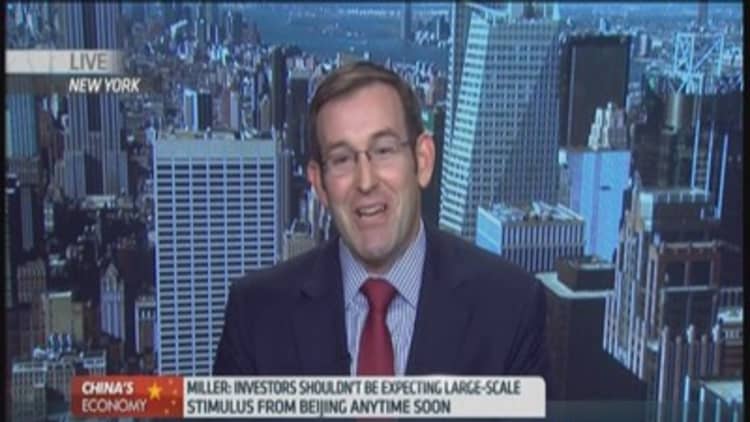Most Asian bourses were higher late Wednesday, as benign Chinese inflation data fueled hopes of additional easing, while a weaker currency provided support for Japanese shares.
Overnight, U.S. stocks mostly advanced with the S&P 500 and Nasdaq Composite halting their worst three-day rout since 2011 as investors considered earnings from JPMorgan Chase, Citigroup and Wells Fargo. The Dow Jones Industrial Average finished flat while the S&P 500 added 0.2 percent and the tech-heavy Nasdaq gained 0.3 percent.
Read MoreWhy the stock market sell-off may be nearing an end
A closely watched ZEW survey showed German analyst and investor morale fell below zero for the first time in nearly two years in October.
In the commodity space, U.S. crude oil posted its biggest percentage loss in about two years overnight on the back of a downgrade in global oil consumption forecasts, projections for another boost in shale oil and reluctance by OPEC members to cut output.
Tokyo gains 0.9%
Japanese equities snapped a five-day losing streak on Wednesday, underpinned by a weaker yen trading above 107.3 against the U.S. dollar. Earlier in the session, the key Nikkei index touched a fresh two-month low of 14,916.
Energy-related stocks were under pressure from declining oil prices; Inpex and Japan Petroleum Exploration lost 1.3 and 2 percent, respectively.
Toyota Motor reversed losses to advance 0.2 percent after the carmaker announced a $187 million investment to manufacture new compact sport utility vehicles in Turkey starting in 2016.
Read MoreWhither China's central bank chief? Nobody knows
Mainland shares up
At midday, China's Shanghai Composite index brushed off a weaker-than-expected inflation number, rising 0.6 percent.
China's consumer inflation eased further in September, the National Bureau of Statistics said on Wednesday, adding to concerns that global growth is cooling fast. Consumer prices rose 1.6 percent from the year-ago period to a near five-year low, compared with the 1.7 percent gain forecast by Reuters.
Wholesale prices, meanwhile, dropped 1.8 percent, versus expectations of a 1.6 percent decline and after falling 1.2 percent in the month before.
Hong Kong stocks traded 0.6 percent higher on Wednesday.

Sydney rises 0.7%
A rise in consumer sentiment for October helped Australia's benchmark S&P ASX 200 index to brush off a benign Chinese inflation data and losses in the energy sector.
The survey of 1,200 people by the Melbourne Institute and Westpac Bank showed the index rose a seasonally adjusted 0.9 percent in October, steadying from a sharp fall in the preceding month. As a result, most retailers benefited; Harvey Norman and JB Hi-Fi closed up 0.9 and 1.1 percent.
Pharmaceutical firm CSL soared 1.4 percent, after announcing that it would buy back $827 million of its shares over the next year.
Woodside Petroleum shed 0.2 percent as oil prices dived more than $4 a barrel overnight.
Read MoreCheapest cities forbusiness class seats, Botox
Seoul loses 0.2%
South Korea's Kospi index was one of the region's worst performers after the Bank of Korea announced a second rate cut in three months on Wednesday, underscoring fears of sluggish global growth. The central bank cut its base rate by 25 basis points to 2 percent, in line with market expectations.
Blue-chips traded in the red on late Wednesday. Top losers include SK Innovation and LG Electronics which tumbled over 1.5 percent each.
Samsung Electronics lost gains midday to shed 0.2 percent. According to Korean media reports, Facebook CEO Mark Zuckerberg reportedly met Lee Jay-yong, Samsung's Vice Chairman, in Seoul for a possible collaboration.
Meanwhile, the South Korean was indifferent to the central bank's move. The currency traded at 1,063 against the U.S. dollar, a touch firmer than Tuesday's closing rate of 1,064.

